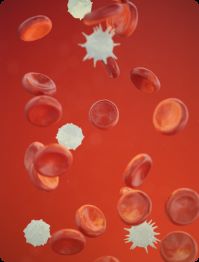Everyone knows moments when you feel like your immune system is a bit weak: quickly tired, more often catching a cold, or just not feeling completely well. These are often signs of a weakened immune system that could use some support. In this article, you will learn how to strengthen your immune system by making small but effective changes to your lifestyle.
We will discuss what exactly the immune system is, how it works and what you can do to strengthen it. You will also discover the most common causes of a weakened immune system and how nutrition, vitamins, breathing techniques and exercise can contribute to improved resistance.


What is the immune system and its defense function?
The immune system is a sophisticated network of specialized cells, tissues, and organs that work together to protect the body from harmful invaders such as viruses, bacteria, fungi, and parasites. This system is crucial for maintaining health and preventing disease. The primary function of the immune system is to identify and eliminate harmful microorganisms before they can harm the body. It acts as a shield that provides defense against a wide range of external threats.
When your immune system is functioning properly, you often don’t even notice that it’s actively fighting off pathogens. However, when your defenses are weakened—by factors such as stress, poor nutrition, or lack of sleep—your body may respond less quickly and effectively to threats. This can cause you to get sick more often or take longer to recover from infections. A well-functioning immune system is therefore the cornerstone of a strong immune system and good overall health.



How does the immune system work?
The immune system works on multiple levels and is powered by key components that work closely together to protect you from infection. One of the most crucial components of the immune system is the white blood cells, also known as leukocytes. These cells circulate throughout the body via the blood and lymphatic vessels, and are the first line of defense against harmful invaders such as viruses, bacteria, and fungi.
Within the white blood cells, there are several subtypes, including essential lymphocytes. These cells play a crucial role in the specific immune response, where the immune system targets specific pathogens. Lymphocytes are divided into two main categories:
Lymphocytes are divided into two main categories:
- B cells: These cells produce antibodies that specifically target pathogens that the body has previously encountered. This allows the body to respond more quickly and effectively to known infections.
- T cells: These cells are responsible for directly destroying infected cells and also support other immune cells in their defensive tasks.


When all components of the immune system work well together, the body can quickly and efficiently ward off both acute and chronic threats. A well-functioning immune system can effectively ward off threats, but certain factors can weaken its function.
Causes of a weakened immune system
A weakened immune system can be caused by a combination of factors, which can negatively impact overall immunity. The most common causes are:
- Stress: Chronic stress increases cortisol, which can suppress your immune system.
- Vitamin deficiency: A deficiency of essential nutrients, such as vitamins C and D, can lower your immune response.
- Microbial imbalance: An unhealthy gut microbiome can weaken your immunity.
- Diseases: Chronic conditions such as diabetes can affect the functioning of the immune system.
How do you strengthen your immune system?
There are several ways to boost your immune system, including changes to your diet, exercise, and lifestyle. Here are some effective strategies:
1. Nutrition
A healthy diet is essential for a strong immune system. Your gut microbiome, the collection of beneficial bacteria, plays a vital role in the production of immune cells. Foods rich in fiber, such as vegetables, fruits, and fermented foods, help keep your microbiome in balance. Eating a variety of unprocessed, whole foods can help support a healthy immune response. testing your microbiome can provide personalized insights, but it’s usually a good idea to consult a healthcare provider before making major changes to your diet.




2. Vitamins
Vitamins such as C, D and zinc are essential for the proper functioning of the immune system. Vitamin C plays a role in strengthening the immune system by supporting various cellular functions. Vitamin D is crucial for activating immune cells such as T-cells, which play a key role in fighting infections. Zinc helps with tissue repair and supports the immune response. Before starting supplements, it is wise to consult with your doctor or use medically approved tests to determine any deficiencies.
3. Breathing
Breathing techniques can indirectly support your immune system by helping to reduce stress. Chronic stress can weaken the immune system, so daily breathing exercises or techniques like deep abdominal breathing can help you better manage stress. This, in turn, can improve the body’s immune response by reducing inflammation and supporting the production of immune cells.
4. Movement
Regular exercise, such as walking or yoga, promotes blood circulation and supports the immune system. Moderate exercise can help strengthen the immune system by increasing the circulation of immune cells in the body. However, intense workouts, especially without adequate recovery, can temporarily lower your resistance. A good balance of regular exercise and adequate rest is essential for maintaining a strong immune system.
5. Lifestyle changes
Getting enough sleep (7-9 hours per night) is essential for a well-functioning immune system. Chronic sleep deprivation reduces the production of immune cells, making the body more susceptible to infection. Stress management techniques such as meditation or mindfulness can help reduce stress hormone levels, which promotes the production of immune cells. Thyroid problems can also affect the immune system, so it may be helpful to have your thyroid function tested if you are experiencing symptoms of an imbalance.



Boost your immune system naturally
Here are five alternative tips to help you prepare your immune system for winter:
1. Hydrate sufficiently
Although we often feel less thirsty in the winter, drinking enough water is essential for a well-functioning immune system. Water helps remove waste from the body and keeps the mucous membranes hydrated, which can help prevent infections. Aim for 1.5 to 2 liters of water per day.
2. Eat colorful fruits and vegetables
Vary your intake of fruits and vegetables of different colors. Each color provides specific nutrients that help strengthen your immune system. Think orange carrots (beta-carotene), red tomatoes (lycopene), and purple berries (anthocyanins). These foods help your body get a wide range of antioxidants.


3. Use herbs and spices
Herbs like turmeric, ginger and garlic are known for their anti-inflammatory and antibacterial properties. Add them to your meals regularly. Ginger tea or garlic in your dishes can be a natural way to support your immune system.
4. Get fresh air and sunlight
Even in winter, it is important to get some fresh air every day. Fresh air and sunlight stimulate the production of vitamin D, which is essential for a strong immune system. In addition, a walk outside can improve your mood and reduce stress.



5. Try cold showers or alternating baths
Short cold showers or alternating baths (cold and warm water) can stimulate blood circulation and help your body adjust to temperature changes. This not only strengthens your immune system, but can also increase your energy levels and improve your alertness.
By following these tips, you will naturally strengthen your immune system and prepare yourself for the challenges that winter brings.
Conclusion
Strengthening your immune system starts with making conscious, healthy choices in your daily life. Whether it’s making dietary changes, taking the right vitamins, exercising regularly, or reducing stress, every small step adds up to a stronger immune response. By actively paying attention to these factors, you can better protect your body from disease and improve your overall health.

To work on your health in a more targeted way, it can be useful to understand what your body needs at this moment. Easly offers various health tests that can help you gain insight into your immune system and general health. Take control of your health and discover which test suits your situation best. This way you can take targeted steps towards a stronger immune system and better resistance, both now and in the future.









